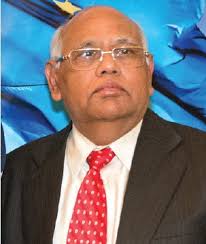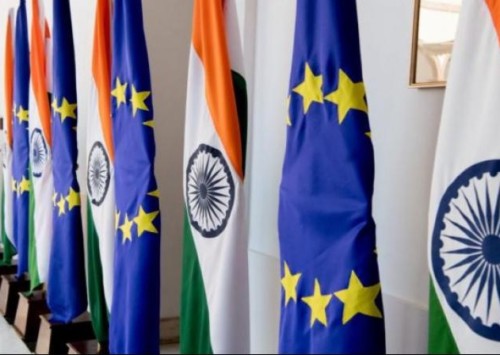EU-India Virtual Summit a turning point in bilateral ties
Sunil Prasad, secretary general of the Europe India Chamber of Commerce (EICC), the apex trade body promoting Indian businesses in EU, has been a keen observer of the development of relationship between the two sides. In an interview, Prasad says that even though there was no progress on the long-pending Free Trade Act, the Summit saw a rich and fruitful discussion on several other issues of global and bilateral importance.
Do you think the Summit was a wasted opportunity as several key bilateral issues have been pushed to the backburner?
On the contrary. This 15th EU-India Summit marks the turning point in their relations. If you go into the details of the joint statement and read in between the lines, you will see that the summit was a very productive and in fact on desired lines. I can also say that the leadership of the two largest democracies demonstrated that they are on the same wave-length on the geo-political and geo-economic dynamics. We are passing through a monumental health pandemic and the summit was held under the shadow of this crisis, and as such it was natural that the emerging threat on account of the invisible enemies was the main issue. Naturally, they focused on three important issues: Covid-19, its impact on global economy and how to rebuild their economic prosperity, and regional and security issues. The summit has re-enforced the underlining message of need to strengthen the bilateral relationship.
EICC had pinned hopes on progress in FTA. Why do you think it was sidelined?
Given the issues confronting the leadership of India and EU, it was natural that they discuss the challenges of our times and how to confront them in solidarity and with international cooperation. Trade and investment constitute an important part of the economic relations between EU and India and we believe that this can play a big role in their future relations. The EU is India’s largest trade and investment partner but it represents only about 2 pc of EU external trade. This is not acceptable and there is room for enhance this. This is an area which offers potential for significant growth, and both must take steps to realise the potentials. Yes, it is true that we had hoped that the leadership would come up with some firm “time bound” commitment. As you know, the FTA is in discussion for last 13 years and it is time that they conclude this without delay.
We realise the compulsions on both sides but we are really glad that they re-confirmed their commitment towards a balanced, ambitious and multi-beneficial trade and investment agreement. The fact that both parties agreed to re-establish regular High Level Dialogue at ministerial level to provide guidance to the bilateral trade and investment relations shows that they are “on track” and we hope that their dialogue would bring the desired result.
Do you see EU coming round to Indian demands on free movement of workers?
This is an issue which has been a sticking point in their bilateral trade discussion. But I understand that both parties realise the realities of the issue and I am hopeful that they shall come up with some useful solutions. What they have not been able to do for these 13 years, the impact of Covid-19 will help them do. Europe will need healthcare professionals to help them cope with the post-pandemic effect and here is an area which can serve as a catalyst.
On healthcare, the EU had been taking several anti-free trade steps like seizure of Indian generic medicines meant for third countries but transiting through EU ports. Do you see a liberalisation on that count?
As I said earlier, the Covid-19 has changed the dynamics of the issue. Today, no country speaks of banning drugs but co-operating. The seizure of Indian shipment of drug was a “misunderstanding” and a lack of knowledge on part of EU. I hope EU has graduated from its earlier “stunts” and embraced the realities. It was said that the seizure of drugs was the start of a trade war between EU and India but nothing of this sort happened. In my view this action represented growing protectionism and India responded well with its own measures. I hope that the global health pandemic would not trigger off protectionism, and EU would act wisely.
The EU has signed up for 400 million doses of Covid-19 vaccine from AstraZeneca. Will it share any with India in case of need here?
Of course, EU will share and if India produces it, India should share with EU. Fighting Covid-19 needs international cooperation and strong commitment. In today’s world global economy and lives of individuals have become so integrated that anything happening in one part of the world has its effect on every part of the world. If EU and India want to remain relevant in this health crisis and post-pandemic world they will have to share what is good for humanity. The summit declaration also clearly states that global cooperation and solidarity is the need of the hour. Both have committed that Covid-19 vaccine would be available for common good at affordable prices. Mutual synergy in the field of healthcare will be crucial and I am sure they will do what is right.
Can India hope to have more of its qualified healthcare professionals find jobs in the EU?
Again, as I said earlier, the Covid-19 has brought the world together and closer. This is true for EU and India. Given the expertise the Indian healthcare professionals have shown in fighting the pandemic and saving lives, EU should welcome with open arms Indian healthcare professionals to work in the EU. I can also say that when EU-India FTA negotiations started, it was just in the midst of the financial crisis, which generated protectionism and Europe was against movement of professionals in the EU but today the situation is different. The health pandemic has a great potential for EU-India collaboration, and you would not find the resistance that was seen ten years ago.
As EU moves away from the US and India-US ties strengthen can this have any impact on the EU-India ties? Ditto with India-Russia relations.
It is not true that EU is moving away from US. Both have their own agenda and they act according to geo-political realities. They distance themselves on issues and reunite themselves immediately after. EU and US are made for each other and their interest lies in working together. Let me say that one of the striking features of EU-India relations, is that EU’s relations with India is neither complex nor consequential but managing it would require a careful calibration with long term vision. Along with structural framework and policy mechanism of India’s relations with the EU, there is something more than the institutional thinking.
Although US-India relation remains one of the “central pillars” of India’s foreign policy, there is growing realisation in New Delhi that a shared commitment on peace, security and development with Brussels will add more power to India’s quest of playing a larger global role.
And on India-Russia ties?
While India considers Europe as “dependable” partner”, it will not sacrifice its interest in further enhancing its relations with United States and US will remain its principal partner. It should also be interesting to note that in spite of sanctions against Russia, India has been able to maintain its friendship with time tested friend Russia.
When India revoked Article 370 of the Constitution to withdraw the special status given to Jammu and Kashmir and bifurcated the state into two Union Territories — Jammu and Kashmir, and Ladakh, Russia was the first P-5 country which backed India’s move saying “Change in the status of the state of Jammu and Kashmir and its division into two union territories are carried out within the framework of the Constitution of the Republic of India”. Traditionally, Moscow supported India’s position on Kashmir and erstwhile Soviet Union vetoed number of resolutions on Kashmir in UNSC during the Cold War period. As such, India cannot risk losing an old ally and partner for a new friend and India cannot afford to create space for strategic readjustment.












